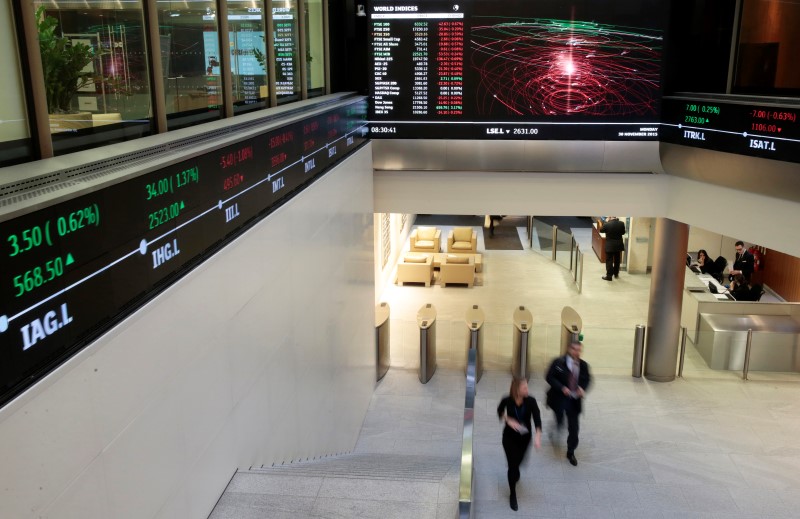By Mike Dolan
LONDON (Reuters) - You may reasonably wonder just what sort of political upheaval it takes to upset financial markets these days.
Despite a series of potentially seismic shifts in the political landscape over the past two years, world asset prices appeared to suffer less and less lasting damage. And a similar scenario is playing out again this year around Brexit and the possibility of a Donald Trump White House.
A Greek exit from the euro that could have unraveled the single currency, a Scottish exit from the United Kingdom, a maxi devaluation of China's yuan were just some of the bogey issues feared fleetingly over the past two years.
And yet global equity and debt markets, to the extent they were hit at all, bounced back smartly to ever higher highs as measures of volatility ebbed.
For money managers then, it paid to have shut out the noise and to have focused on more prosaic long-term valuation metrics or glacial global growth shifts rather than panic about the outside risks of blowups by voters or in the halls of power.
But 2016 should have changed that - not least because near misses may now be turning to direct hits.
The two giant political wildcards of this year are clearly Britain's referendum on leaving the European Union and the U.S. presidential election where the Republican candidate Donald Trump has pitched up as an anti-establishment populist opposing world trade deals, immigration and traditional alliances.
The two issues have been joined at the hip in many respects as they pose realistic threats to the political and economic policy status quo and have been slow-burning legacies of the slow growth and rising inequality seen since the financial crisis almost a decade ago.
November's election has yet to play out, even if Trump's candidacy itself has already rocked the political world.
But the vote for Brexit in June was a genuine shock, unexpected by financial or betting markets - not to mention the British government or international policymakers and institutions.
Sterling's 10 percent lunge within hours of the vote, and the fact it is still down almost 9 percent against a broad basket of trade-weighted currencies, is a clear reflection of that.
But UK stocks and bonds, fed by series of British economic reports showing impressive resilience in household consumption, construction, exports and investment activity in July and August and aided by fresh credit easing by the Bank of England, quickly brushed off the vote almost as if it never happened.
SQUARE ONE?
Even in sterling-adjusted terms, Britain's blue-chip FTSE 100 (FTSE) index is back within a whisker of where it was the day before the vote. On the same basis, the FTSE250 (FTMC) of domestically focused mid-sized companies is only down about 5 percent. And both are up smartly when priced in pounds.
UK government debt prices, thanks to the BoE's relaunched bond-buying campaign, have all surged since.
Given that many see Brexit as causing irreparable damage to the wider EU, the lack of subsequent impact on either euro zone economic indicators or euro financial market prices has been even as much of a eye-opener.
And with Trump just 5 points behind Democrat Hillary Clinton in U.S. opinion polls, betting markets put his chances of winning the White House at least 1-in-3.
Given the bookies ascribed similar odds to chance of Brexit, those numbers should resonate.
Yet U.S. markets' serene response to the Brexit vote and relatively plain sailing just over two months before the presidential election show again how shifting political sands are not scaring investors.
The S&P500 of U.S. stocks have been stalking record highs all summer, with the ViX measure of equity volatility several percentage points below long-term averages.
Questions range from whether markets can even fathom non-specific, non-numerical political risk to whether the extent of their discounting is a better measure of the real economic or regulatory disturbance.
Some investors suspect less of a shock than a slow-burning hit over many years. Others suggest ambivalence about the real economic fallout from the political disturbances; and even some insist they may be positive as either stimuli for new policy thinking or even in bringing legitimacy to fraying democracies.
Yet, the tendency for markets to return or even remain at square one these days suggests a long haul is already in the price and there is a very high bar now in terms of political upheaval that could shift that dial much more negatively.
Mouhammed Choukeir, chief investment officer at wealth manager Kleinwort Benson, reckons that despite short-term market impacts, political angst tends to have very little impact on long-term asset returns.
And for him, the reverberations of the credit crash almost a decade ago are still playing out - a liquidity crisis leading to a banking crisis; to an economic crisis; to a euro, emerging market and oil market crisis, and now a Western political crisis. Those political are risks and could pack a punch.
But he stressed that markets have already absorbed an awful lot of long-term negativity on growth and cheap money for many years hence into prices and behavior and U.S. and European markets are neither hugely undervalued nor overvalued to boot.
"There's a wide acceptance that we live in a slower growth world, wide acceptance we're in a lower return world and people are increasingly comfortable investing against that backdrop."
